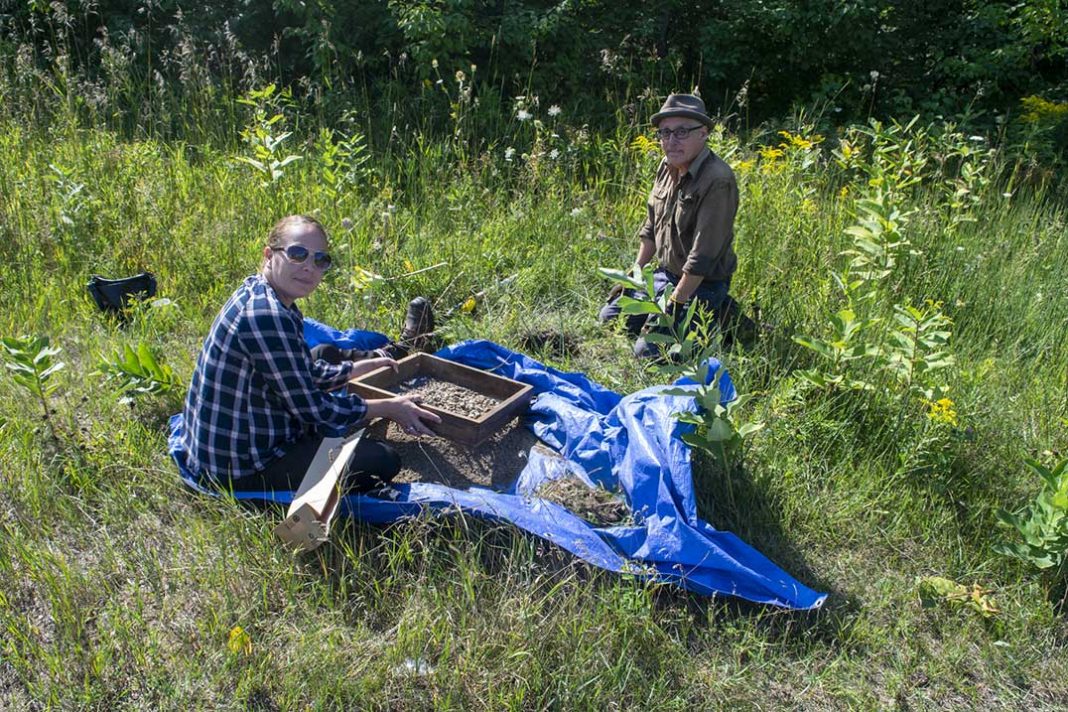M’CHIGEENG – Dozens of First Nation band members from the Manitoulin and North Shore area have received archaeological training endorsed by the Ontario Archaeological Society (OAS) through collaborative workshops aimed at growing Indigenous peoples’ capacity of stewardship over their ancestral history.
“We’re hoping they get more involved in archaeology,” said Sarah Hazell of Nipissing First Nation, the project co-ordinator and a PhD candidate in anthropology at McGill University. “About 80 percent of archaeological sites in Ontario are Indigenous but most are discovered by non-Natives.”
The archaeological monitoring training program had sessions at Sagamok and Mississauga First Nations earlier in the summer, with a full attendance roster at each event. When the program came to M’Chigeeng First Nation and the Ojibwe Cultural Foundation (OCF) recently, its attendance was just as packed as the earlier two sessions.
“We were supposed to have a max of 36 participants in these three communities, but we had a great year and got 11 First Nations represented and 47 participants. It demonstrates that interest to build capacity in archaeology,” said Ms. Hazell.
OAS president Alicia Hawkins secured resources through the Ontario Trillium Foundation to help fund this initiative and expand it for communities in Northern Ontario. Through previous years, OAS has run scaled down versions of this training on a volunteer basis for First Nations in southwestern Ontario. This summer’s three stops were co-ordinated with the help of the Anishinabek Nation, which issued a call for interested communities to request a training session.
“We’re really thrilled to be offering this outside of the area we normally do,” said Ms. Hawkins. “We’re hoping we can provide people with training so they can go out and evaluate what archaeologists are doing. Ultimately, we’re looking at Indigenous heritage. It’s about Indigenous people managing Indigenous artifacts.”
Much of the program involved classroom education sessions where the attendees learned a much more in-depth historical account of the region than is commonly shared. They spent one day outside in the grounds around the OCF, digging small holes and panning the dirt through screens to reveal what hidden artifacts may lay within.
The first test pit of the day had glass, nails, a piece of a pipe, flaked quartz and a slate pencil—evidence of human occupation of the site dating back to the early 20th century. The artifacts were collected into bags and then all the dirt excavated from the test holes was used to fill in the voids.
Program participants also learned the use of a total station—a laser surveying tool—so that each dig site could be plotted on a map.
Paige Manitowabi was one of the participants learning how to use the total station. She said she signed up because of past artifacts and human remains that have been removed from the environment.
“I joined this program to help bring my ancestors home,” she said.
Helping her was Sheshegwaning First Nation’s Margo Turple who said she has always held an interest in archaeology but followed a different career path.
“I’ve loved this since I was a kid. I’m glad I had the opportunity to do this program,” said Ms. Turple. “It’s mind boggling. I never knew a lot of this history and I’m still learning.”
OCF acting director Naomi Recollet said the program offers the blending of traditional Anishinaabe knowledge and the knowledge taught in the education system.
“It provides a good hands-on experience. We’ve had local elders and people from other communities here, too,” said Ms. Recollet.
“We hope to do more with the artifacts we have and work on further partnerships such as this,” she said, adding that the OCF has more than 200 boxes of historic materials from the region. This is the first certificate training program offered through the OCF, according to Ms. Recollet.
The team managed to uncover a variety of artifacts at the OCF property including bone buttons, iron works, kaolin pipe fragments and potential pre-contact stone tools. The analysis of the artifacts is ongoing.



